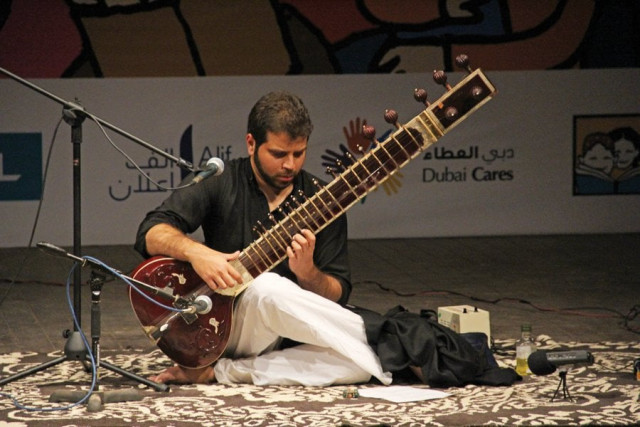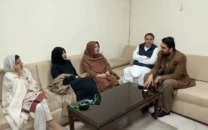Conventional system of rote-learning leaves no room for creativity, complain teachers
Experts, teachers speak out against traditional methods and stress on networking.

A musician performs the CLF anthem, ‘Humein Kitaab Chahiye’, written by Zehra Nigah on the first day of the festival. The audience were handed out sheets of paper with the lyrics of the anthem and were encouraged to sing along.
The traditional system of assessing children’s progress at schools often backfires for the teachers who want to encourage creativity in the classroom. Teachers voiced out their opinion at one of the sessions held at the first-ever Teachers’ Literature Festival that was organised at the Arts Council of Pakistan on Thursday.
“Imagination in action is creativity, while rote-learning practices that prevail because of the burden teachers face for covering syllabuses curb students’ imagination,” said Seema Zahid, headmistress at a public school.
Moderated by the managing director of the Oxford University Press and a developmental researcher, Ameena Saiyid, the session was aimed at letting the teachers speak out on what promotes or inhibits reading and creativity in classrooms.
“The school administrations as well as parents have become obsessed with the fancy grades that are mostly attached to a child’s better ability to replicate the information from the whiteboard in the classroom to their answer scripts in the examination centre,” said Fauzia Rahat, who teaches Urdu at Bahria College. “If a teacher is asking a student to just replicate information or copy it from the board, obviously he is not functioning at the level that is required for a higher cognitive demand.”
From amongst the panellists, Ameena Saiyid expressed agreement with the speakers and said if we want the students to be able to think, the school administrations as well as parents should provide room for introducing creativity within classrooms.
For Saiyid, reading and creativity go hand-in-hand and the teachers with their creative interventions in the classrooms can revitalise the reading culture that has been diminishing amongst the children in these years.
While introducing another perspective in the discussion, former Punjab education director Jamil Najam said that when the teachers have ended up being mediocre, how one could expect them to motivate the children for reading and writing. “Though a little bit of lesson planning and classroom management is done at the private schools, the realm of public-sector education is barren in this trait,” he lamented.
In response to the teachers’ oft-repeated complaint that students do not read books these days, Swaleha Alam Shahzada, executive director at The Citizens Archive of Pakistan, said that it is not fair for a teacher to complain. “If the students do not bother to read books then the teachers are at fault. Creativity is in your hands and you are the biggest tool to inculcate it in your students,” said Shahzada. “The more you fuel and feed your own creativity, the more you will be able to unleash your students’ creative energy in the classroom.”
Journalist Zubeida Mustafa believed that networking of teachers, which is almost non-existent in our society, is imperative for the teacher’s fraternity to learn from the experiences of each other and by sharing ideas and techniques.
Published in The Express Tribune, February 21st, 2014.



















COMMENTS
Comments are moderated and generally will be posted if they are on-topic and not abusive.
For more information, please see our Comments FAQ